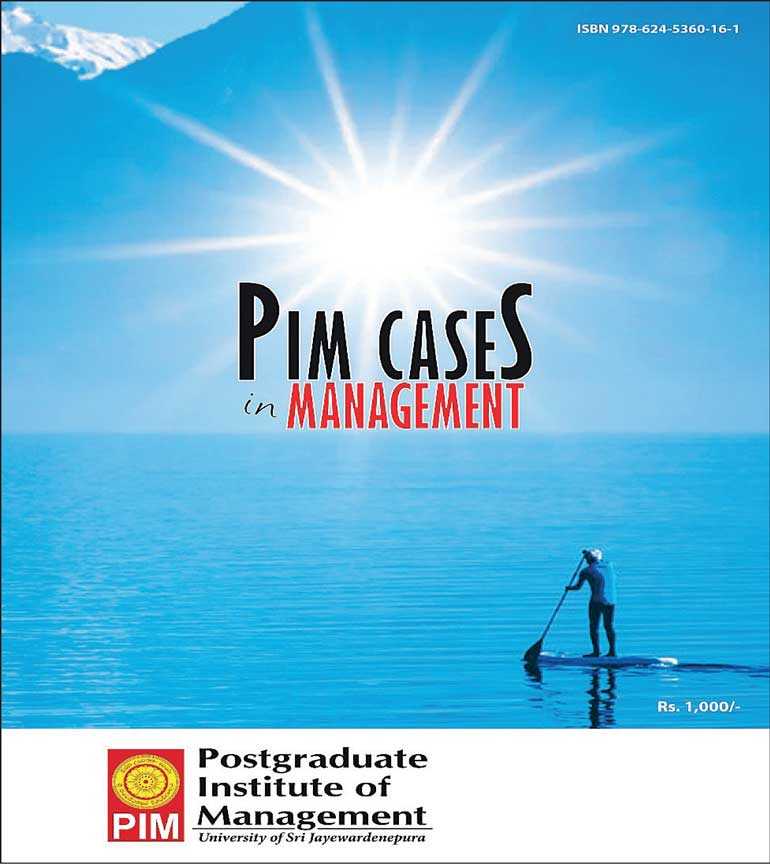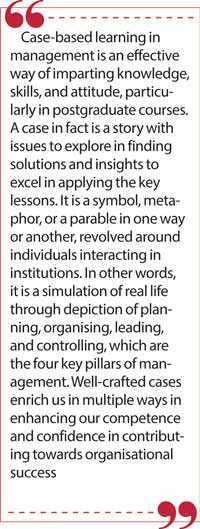Tuesday Feb 17, 2026
Tuesday Feb 17, 2026
Monday, 5 April 2021 00:00 - - {{hitsCtrl.values.hits}}

In believing in excellence as essence, the PIM requests you to read, reflect and relate so that the resulting actions would lead to higher results in a wider arena
 I am delighted to write my 400th column of Humane Results. It gives me added pleasure as I am writing on a pioneering initiative by a premier postgraduate entity in Sri Lanka. The Postgraduate Institute of Management (PIM), the nation’s management mentor, is much delighted to present its pioneering collection of cases based on the projects undertaken by students local and overseas, as ‘PIM Cases in Management’. It was a collective authorship by myself and my faculty colleagues Dr. A.K.L. Jayawardena, Dr. Samantha Rathnayake and Dr. Ravi Bamunusinghe. Let us discuss the details further.
I am delighted to write my 400th column of Humane Results. It gives me added pleasure as I am writing on a pioneering initiative by a premier postgraduate entity in Sri Lanka. The Postgraduate Institute of Management (PIM), the nation’s management mentor, is much delighted to present its pioneering collection of cases based on the projects undertaken by students local and overseas, as ‘PIM Cases in Management’. It was a collective authorship by myself and my faculty colleagues Dr. A.K.L. Jayawardena, Dr. Samantha Rathnayake and Dr. Ravi Bamunusinghe. Let us discuss the details further.
Overview
Case-based learning in management is an effective way of imparting knowledge, skills, and attitude, particularly in postgraduate courses. A case in fact is a story with issues to explore in finding solutions and insights to excel in applying the key lessons. It is a symbol, metaphor, or a parable in one way or another, revolved around individuals interacting in institutions. In other words, it is a simulation of real life through depiction of planning, organising, leading, and controlling, which are the four key pillars of management. Well-crafted cases enrich us in multiple ways in enhancing our competence and confidence in contributing towards organisational success.
These carefully selected cases are primarily prepared by our committed ‘learning partners’ as their final projects, which are ably supervised by the PIM faculty, with the guidance of the PIM’s research centre. The cases were further refined and reinforced with additional material with a view to providing a rich platform towards reflective reading, ease of comprehension, rigorous investigation, resound analysis and resourceful application. It is worthwhile stating the essence of each case in identifying the priority management theme in focus.
Creating shared value through ‘Prajava’
The collection of cases begins with a shared value creation initiative now known as ‘The English Tea Shop’, with an interesting term ‘Prajava’ derived from the Sinhala language highlighting the community involved. This case revolves around making organic tea for a niche market in an innovative manner. It reveals an entrepreneurial initiative by Suranga Herath, and the power of Prajava in creating shared value, initiated by a transformational leader in action. It is an invitation to discover the significance of demonstrating sustainability, implementing shared value creation and transformational leadership.
The input for this case study was from a final year MBA Management Case Study Project submitted to the PIM by Lalitha Udayanga, a Telecommunication Engineer at the Mobitel Lanka Ltd.
Exploring elegance in elephant dung
The second case on Maximus invites us to have a deep understanding of social entrepreneurship, and also to identify the ways of implementing solutions to social, cultural, or environmental issues with the discovery of entrepreneurial characteristics.
This case revolves around an entrepreneurial firm creating handmade paper and other value-added products out of elephant dung. Maximus with its humble beginnings has come a long way in becoming a dominant player in eco-friendly manufacturing of 100% recycled products. The case invites us to have a deep understanding of social entrepreneurship, and also to identify the ways of implementing solutions to social, cultural, or environmental issues with the discovery of entrepreneurial characteristics.
The learning partners involved in providing the inputs for this case were J.B. Amandakoon, Senior Quality Assurance Lead, and S.Y. Wijesiri, Manager – HR Strategies and Policy Section of Cambio Software Engineering Ltd.
Mega heights of multi-constructions
The third case on multi-constructions revolves around visionary leadership, organisational culture, and human resource development (HRD) climate in reaching mega heights.
This case reveals the solid success of a leading construction firm with its vibrant leadership in being visionary towards building a sustained competitive advantage. Harping on its strengths and capitalising on its rich human resources, creation of a conducive climate for performance with needed cultural elements are key features. As such, the case revolves around visionary leadership, organisational culture, and human resource development (HRD) climate.
It was the MBA final project inputs of I.L. Ariyarathna, Operations Manager, Refreshments Category, Unilever Sri Lanka Ltd. and A.M. Sampath, Head of Procurement, Phoenix Industries Ltd., used for developing the above case.
Showcasing excellence in enterprise technology sphere
The fourth case is about showcasing excellence in enterprise technology sphere, which focuses our attention to explore innovation in the context of a supportive organisation culture with visionary leadership.
This case revolves around the global reach and relevance of a local software developer in the broad area of enterprise platforms. It highlights the power of a persuasive leader in creating a world class organisation providing a variety of web-based solutions. The case hinges on the significance of a superior support service model as well as an open-source business model. It invites us to explore innovation in the context of a supportive organisation culture with visionary leadership.
The learning partner whose inputs were involved was K. Chandrasekera, Head of Product Innovation IT Group of John Keells Computer Services.
 Venturing stormy seas with changing captains
Venturing stormy seas with changing captains
The fifth case is a success story of a family business involving two generations, and reveals us four learning phases, namely, learning business, learning our family business, learning to lead our business, and learning to let go of our business.
This case showcases the success story of a family business involving two generations. It highlights how successful family business leaders understand the progression through two stages, apprenticeship, and stewardship. Optimising the likelihood of business survival requires family businesses to lay forth a workable plan in securing next generation involvement.
The inputs from Poorna Senaratna, Manager – Technical Operations/Scrum Master at the Savantis Solutions Lanka Ltd. and W.D.H. De Mel, Lecturer at the Department of Management and Finance, Faculty of Management, Social Sciences and Humanities, at the General Sir John Kotelawala Defense University were used to develop this case.
Education brilliance in banking and finance
The sixth case included in this volume depicts a dedicated institution for the banking and finance studies as a pioneering move in Oman, inviting us to have a deep understanding of the strategic management process, inclusive of an inspiring vision and an implementable action plan.
This case involves the establishment of a dedicated institution for banking and finance studies as a pioneering move in Oman. It highlights the power of a vision becoming a reality. How valuable is the right way of crafting and executing strategies is also emphasised through a success story of dynamic growth. The case invites the reader to have a deep understanding of the strategic management process, inclusive of an inspiring vision and implementation plan.
The learning partners providing inputs for the development of the above case were Mohamed Farzan and H.C. Feroskhan, lecturers at the Department of Professional Studies and Undergraduate Studies of the College of Banking and Financial Studies, Muscat, Oman. They in fact represents the richness of the six overseas study groups of PIM in the UAE, Oman, Qatar, Bahrain, Kuwait, Bahrain, and Bangladesh.
Baking the local delights in burgeoning dessert
The seventh case is about the Colombo Bakery in the UAE, showcasing the solid presence of seven Ps of marketing, viz. product, price, promotion, place, packaging, positioning, and people.
This case revolves around a successful Sri Lankan entrepreneur baking delightful food items in the United Arab Emirates (UAE). The Colombo Bakery with its humble beginnings has now reached mighty heights with vibrancy of a variety of quality foods at an affordable price with a true Sri Lankan flavour. It highlights the spirit of entrepreneurship whilst showcasing the solid presence of seven Ps of marketing, viz. product, price, promotion, place, packaging, positioning, and people.
Once again, it is a delightful input from two overseas learning partners of PIM, K.A.N.S. Kuruppu, Senior Auditor, Meralis Chartered Accountants & Registered Auditors, Dubai, and R.N. Z. Jayman, Associate Director, Head of Trade Services, Al Hilal bank, Abu Dhabi.
Magnificently serving millions without millionaires
The eighth case involves a multinational giant with a long presence in Sri Lanka providing fast moving consumer goods (FMCG), highlighting the efforts of social marketing.
This case revolves around a multinational giant with a long presence in Sri Lanka providing fast moving consumer goods (FMCG). Its continuous growth amidst local competition is a success story of a pioneer with a social marketing focus. Social marketing aims to influence behaviours that benefit individuals and communities for the greater social good. This case illustrates its promising potential, proven over eight decades of serving millions.
The MBA final project inputs of A.S. Jayatunge, Executive Assistant to HR Director and National Finance Director and Engagement Pillar Lead of Unilever Sri Lanka has been used for this case.
The road less travelled with business excellence by eggs
The ninth case is about a phenomenal progress of an entrepreneurial venture specializing in egg-related food products, namely Raju Omelet, depicting the significance of the need for achievement, risk taking, locus of control, self-efficacy, innovation, pro-activeness, and autonomy.
The phenomenal progress of an entrepreneurial venture specialising in egg-related food products is the simplest way how Raju Omelet could be described. It showcases the entrepreneurial orientation of Rajiv Meherish. The need for achievement, risk taking, locus of control, self-efficacy, innovation, proactiveness and autonomy which are essential for business growth, especially when operating in a highly competitive hospitality industry, are vividly demonstrated in the road less travelled taken by Raju Omelet in demonstrating business ‘egg’cellence.
R.S.D. Perera, Cluster Credit Manager, The Meydan Hotels, Dubai, and M.S. Sudurikku, Senior Technology Auditor, Group Internal Audit, DP World, Dubai, provided the needed inputs through their MBA final year project.
Flying high with people at airport and aviation services
The final case in this collection is all about flying high with people at the Airport and Aviation Services, illustrating the vital presence of the seven Gs of human resource management, namely Goal (strategic significance), Get (attracting right talent), Give (rewarding for results), Grow (nurturing talent), Glue (engaging employees), Glow (driving performance) and Guard (controls for conformance). This case contains the coveted contribution by a set of committed people in the context of airport and aviation. It highlights the strategic significance of linking the people factor to organisational progress.
The learning partner involved in providing inputs was J.A.M.D.S.S. Abeywardena, Deputy Head of Finance and Senior Advisor to the Commercial and Properties Division of the Airport and Aviation Services (Sri Lanka) Ltd.
Way forward
Whilst thanking all those who have contributed towards this coveted publication, it is my heart-felt wish to reiterate the PIM’s commitment towards creating and communicating applicable knowledge as the premier postgraduate management entity of Sri Lanka.
We look forward to seeing the versatility and vibrance of the value addition by the PIM cases to all postgraduate management education providers local, regional, and global alike. In believing in excellence as essence, the PIM requests you to read, reflect and relate so that the resulting actions would lead to higher results in a wider arena.
(Prof. Ajantha S. Dharmasiri can be reached through [email protected], [email protected] or www.ajanthadharmasiri.info.)